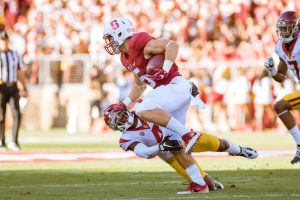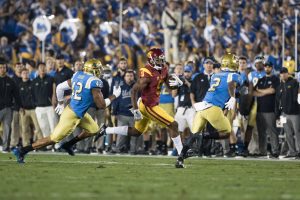Rose Bowl appearance solidifies USC’s resurgence
The first football practice I covered as a staff writer at the Daily Trojan was the one after head coach Steve Sarkisian showed up to a booster event inebriated, went on a drunken, profanity-laced tirade and later apologized for in front of a horde of cameras.
This, I learned as a wide-eyed freshman, was just the latest in a string of embarrassing public incidents for USC since the crippling sanctions were imposed in 2010, from Pat Haden firing Lane Kiffin in an airport tarmac in the middle of the night to Josh Shaw lying about saving his drowning nephew in a pool. And as the revelations of Sarkisian’s battle with alcoholism came to light in the following months, I quickly became accustomed to the football program being known more for off-the-field drama than on-the-field success.
After covering a deflating loss to an unranked Washington and shivering through a dreary Holiday Bowl defeat in an open-air press box (really, Qualcomm Stadium?), I was certain USC’s history of Rose Bowl appearances and national championships would remain just that — purely history — during my four years here.
As my time as sports editor comes to an end, the last game I will cover in this role will be the 103rd Rose Bowl Game, featuring No. 5 Penn State and none other than No. 9 USC. And in between Sark and the smell of roses, I’ve witnessed the rejuvenation of a program that has the Trojans’ stock trending as high as it has been since the Pete Carroll days.
This revitalization, though, has been unlike many others. Rarely can a team simply flip a switch such as Clay Helton handing the quarterback reins to Sam Darnold as quarterback and expect immediate change, but that’s exactly what happened.
It’s funny that just months ago, this team was in complete disarray. They had been woefully blasted out of Cowboy Stadium by Alabama to open the season. They had laid an egg at Stanford, after which some of the players thought their teammates had given up at halftime.
“It’s unacceptable,” junior cornerback Adoree’ Jackson said at the time. “I’m not used to losing. I’ve been here two years and we’ve been losing.”
Another loss the following week at Utah sent the Trojans spiraling to a 1-3 record, their worst start since 2001. They held an emotional team meeting, in which redshirt junior defensive back Chris Hawkins said players called each other out for not giving 100 percent.
Perhaps that worked; or maybe it was just Darnold’s brilliance. It wouldn’t be right to assign all of the credit to the redshirt freshman, but … well, 95 percent of the praise seems about right. Whether it was in the friendly confines of the Coliseum, the immense heat in Tucson, the wet conditions in Seattle or the hostile environment in Pasadena, Darnold handled himself like a redshirt senior. He spread the ball around the field at will, was as elusive as a rabbit, kept plays alive that seemed absolutely doomed and made the clutch throws when he had to. In a matter of weeks, he not only usurped UCLA’s Josh Rosen as the top passer in L.A., but also burst onto the scene as one of the top quarterbacks in college football.
Darnold also opened the floodgates for the offense as a whole to flourish. Sophomore running back Ronald Jones II and junior wide receiver JuJu Smith-Schuster shook off slow starts and wound up with decent seasons. Other players such as sophomore wide receiver Deontay Burnett, redshirt freshman tight end Daniel Imatorbhebhe and senior wide receiver De’Quan Hampton saw their moments because Darnold found a way to get them the ball. And it didn’t hurt that Jackson was running all over the field on offense, defense and special teams, hurdling defenders just because he could.
Brimming with confidence, the Trojans went undefeated at home, beat eventual Pac-12 South champion Colorado, upset Washington and won big over rivals UCLA and Notre Dame. In the process, they went from unranked to a spot in the top 10 in the final regular season College Football Playoff rankings.
“It’s not always how you start,” a much more upbeat Jackson said after an upset win over No. 4 Washington in November, “but it’s how you finish and I feel like we’re taking these steps to make that justice for our season.”
Bottom line: This USC team is nothing like the team that lost to Alabama or Stanford, and definitely not the same team that Sarkisian coached. And all it took was a simple quarterback switch to unleash its full potential, to start to undo the hell the program has been through since 2010. Now, in addition to the brand name it always had, the Trojans have three things every program desires: a head coach with job security, a gem of a starting quarterback and a bright future ahead.
A 34th Rose Bowl appearance will do for now, but odds are that USC will be playing for national championship No. 12 before my time here is done.
Eric He is a sophomore majoring in print and digital journalism. He was the sports editor of the Daily Trojan. His column, “Grinding Gears,” runs Fridays.



